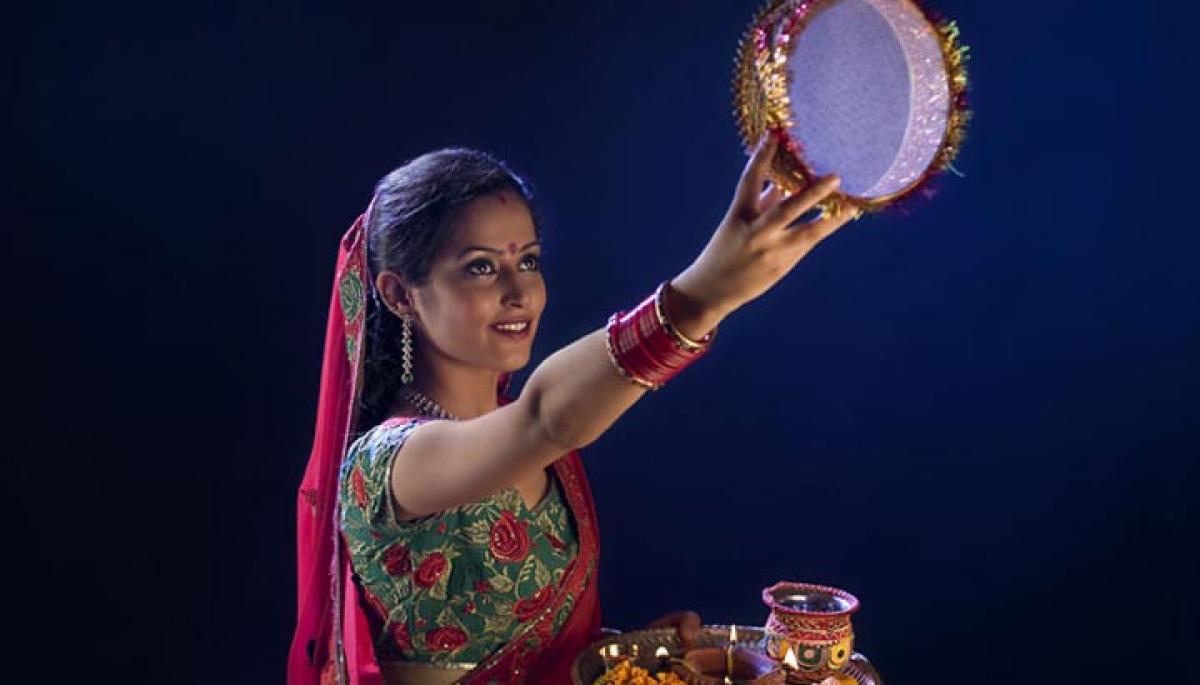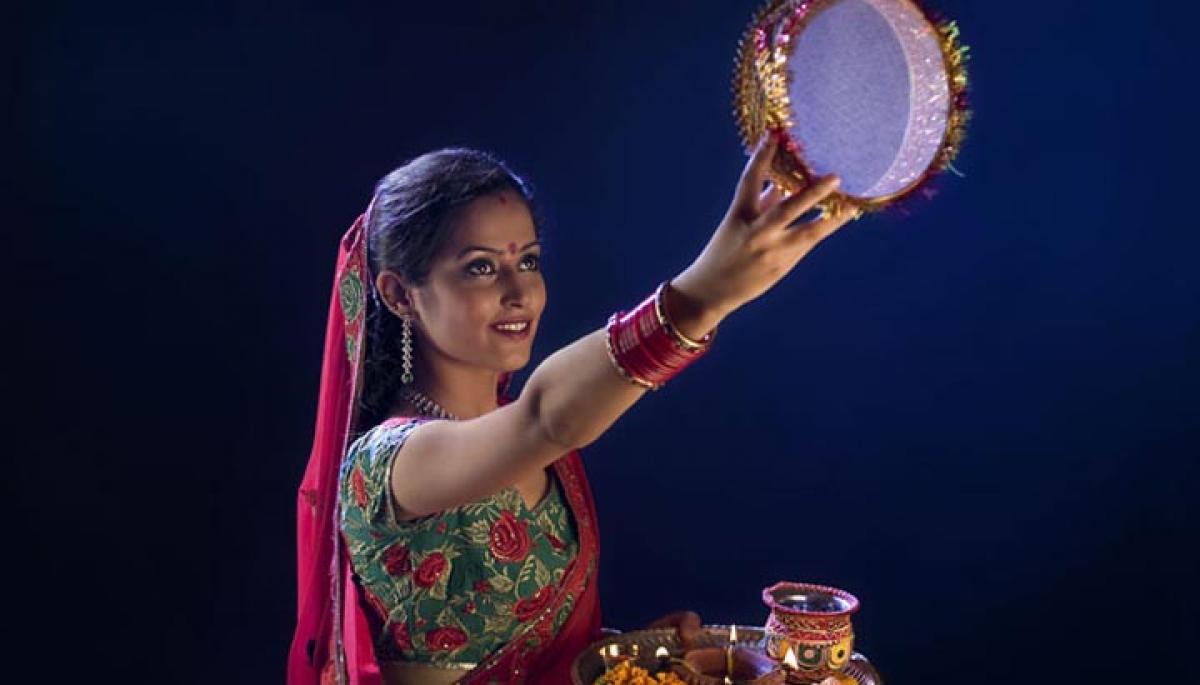Live
- Animal Farm: A timeless allegory of power, propaganda and inequality
- Govt gears up for nine-day ‘Prajapalana Vijayotsavalu’
- Man held for siphoning Rs 8.14 cr in trading scam
- Don’t pressurise students for fees
- Almonds are a key to faster muscle recovery after exercise: Study
- No govt faced so much criticism than Revanth-led Cong in 11 months: Kavitha
- Balineni signed SECI agreement, says Chevireddy
- Infant kidnapped from Niloufer Hospital rescued, cops arrest 3
- Sunny Leone reflects on challenges and preparations for ‘Shero’
- Hyderabad Saree Festival 2024 kicks off in a grand manner
Just In

x
Highlights
Karva Chauth, a primarily North Indian festival, wherein women fast for their spouses\' longevity, is considered a glamorous affair and the ultimate selfless, romantic gesture.
Karva Chauth, a primarily North Indian festival, wherein women fast for their spouses' longevity, is considered a glamorous affair and the ultimate selfless, romantic gesture.

Ironically, it is believed that a combination of a fast, prayers and the blessings of the lunar deity helps women to gain power to confront and prevent unfortunate events for their husbands.
A few decades ago, Karva Chauth was believed to be just a North Indian festival, but now, clever packaging by commercial forces has turned it into a desi version of 'Valentine's Day' that is celebrated enthusiastically across India!
In the southern parts of the country, this festival is observed as 'Karadaiyan Nonbu,' but after five months.
The festival, with its neo-traditional sheen, is popular among rural women too. Thanks to the popularity of Bollywood and TV serials in smaller towns.
Hail Karan Johar and Ekta Kapoor for making the festival "uber romantic" and "uber moralistic" respectively and for helping it to adorn modernise look in the society.
Bollywood has immortalised this traditional ritual, wherein the so-called estrogen brigade stays hungry and thirsty for an entire day only to pacify an angry God, who will bless their husbands and lovers with longer and healthier lives.
Twenty years ago 'Dilwale Dulhania Le Jayenge' (DDLJ) hit the screens, manifesting the festivities of Karva Chauth via its song, where Simran (Kajol) fakes a faint so that Raj (Shah Rukh Khan), whom she loves, would give her the first sip of water instead of her fiance. In this movie, unknown to Simran, Raj also keeps a fast for her.
Movies like 'Hum Dil De Chuke Sanam,' 'Kabhi Khushi Kabhi Ghum,' 'Ishq Vishk,' 'Baabul' and many more have mesmerised the world with their portrayals of this festival.
Also, our TV channels feature pseudo-contemporary ads that play an oxymoronic rub-a-dub with progressive ad campaigns espousing gender equality and this contra-positioning ultimately ensures that the materialism and consumption industry thrives.
Although, Bollywood and Indian sitcoms have glamorised this practice to an extent, there remains a difference between reel and real celebrations. The silver screen has shown us that a wife can look super pretty despite not eating or drinking anything and can do an entire dance routine and sing in an empty stomach, but in reality, a hungry wife can really get cranky.
"Bollywood has actually showcased this tradition in a very positive manner. It has inspired women so much that they are ready to ignore their health problems just to mark the ritual. Like, my mother is a diabetic and is supposed to eat after every two hours, but still she fasts every year," says a worried daughter and journalist Chandni Mathur.
"For some, it has also become a matter of pride and prestige as they fear they will be judged as "uncaring" wives by the society," she further told ANI.
The cosmetic and jewelry industries have also played major roles in publicising Karva Chauth. These industries reportedly do brisk business during this over-hyped occasion.
It's a known fact that through superstition, discrimination and coercion, the Indian society starts to instill a feeling of inferiority in its women at a very young age. They are conditioned to believe that their abstinence will ensure longevity for their spouses and this conditioning has been fanned by Karva Chauth for centuries. However, the trend is changing.
"I don't see a point in starving yourself for an entire day just to express love and affection to your spouse. There are several other ways to do that. In my opinion, even loved ones won't want you to suffer. Moreover, I have seen couples being all mushy-mushy only on selective days; what about the rest of the year?" asked a non-believer Meghna Kapoor.
Today, with all the new wave of feminism and demand for equality for women, many consider this Hindu Valentine's Day as a grim reflection of a dystopian mindset that smacks of chauvinism and as a symbol of cultural repression of women. For many, this backward, regressive custom, which is steeped in superstition and showmanship, is meaningless.
"The tradition goes against the concept of gender equality. Why only women are expected to go through such things, like, sacrificing food to make your husband live longer? I know, these days, guys too are taking part, but how many? Very few. Moreover, they don't get judged if they don't fast," says feminist Srishti Soni.
It may be unrealistic to starve, but at the end of the day, all that jazz with the pujas, the thalis, the sisterhood and the stories of devout wives is romantic for most. (ANI)

Next Story
More Stories
ADVERTISEMENT
© 2024 Hyderabad Media House Limited/The Hans India. All rights reserved. Powered by hocalwire.com







